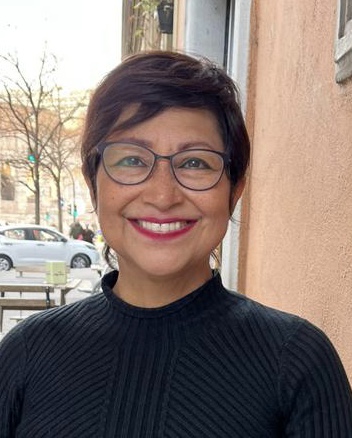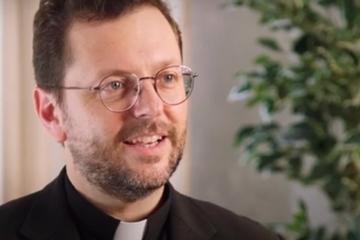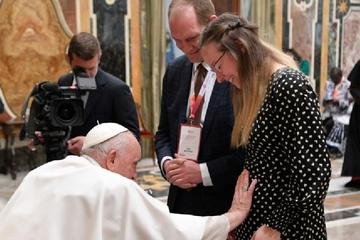
The Lay Centre was pleased to welcome three women from Mexico, who studied for the diploma in safeguarding at the Institute of Anthropology of the Pontifical Gregorian University in Rome this past semester.
In this article, Maria Guadalupe Gonzalez de Costilla from Monterrey, a city in the northern state of Neuvo Leon, Mexico, shares her motivation to study and work in safeguarding.
Could you tell us about yourself: your country, your experience, studies and work?
I am a clinical psychologist. My family is very hard-working and holds many values, especially the values of family unity and respect.
I studied at the Autonomous University of Nuevo León in the faculty of psychology, from which I graduated in 1985. Later, I did post-graduate studies in clinical psychiatry and psycho-diagnosis at the same university. I earned a master’s degree in psychodrama and a second master’s degree in the pastoral care of prevention, the latter at the Pontifical University of Mexico. I graduated from CEPROME, which is the centre for the protection of minors in Mexico, and I have been collaborating with CEPROME since 2021. I have earned teaching diplomas.
I have worked in various health care institutions, orphanages, a psychiatric hospital, a centre for juvenile offenders, my state’s health department and in various universities. I also taught psychodiagnosis in a diploma program at the Autonomous University of Nuevo León for 20 years. For the past two and a half years, I have worked for a diocesan nonprofit institution called “Fundación el Roble,” which is a centre for the protection of minors and the prevention of sexual crimes. I have also taught at the diocesan institute that confers diplomas in prevention.
I worked as coordinator of the psychology department of the seminary of the Archdiocese of Zacatecas, Mexico, for 13 years.
I give workshops in different seminaries and formation houses for male and female religious in Mexico, and I offer psychological counseling to priests, seminarians and religious men and women.
What inspired you to study for the diploma in safeguarding at the Pontifical Gregorian University?
In the first place, my love for the Church, the desire to collaborate by contributing, as we say in Mexico, “a grain of sand,” to be prepared to care for child victims of abuse and to understand the psychodynamics of abusers and how to approach working with them.
I am also motivated to bring knowledge to my country, share it with my colleagues and students, and collaborate in prevention and ongoing training.
How will you put to good use what you learned in Rome when you return home?
In my daily work and in supporting the “Fundación el Roble,” in teaching and in counseling practice. I will also put it to use working in primary and secondary prevention, in workshops, and in the classes that I teach, both at the university and at the diocesan institute.
What challenges did you face coming to Italy during the pandemic?
My main challenge was being away from my family, my patients and work activities. It is important to mention the health protocols and the care that were taken to follow them and to encourage us also to be careful.
Could you tell us something about your experience at the Institute of Anthropology of the Pontifical Gregorian University and The Lay Centre?
I feel very honoured to have studied for this diploma in safeguarding at the Pontifical Gregorian University. The teachers were of the highest quality, very humane and committed to the issue of protecting minors. The methodology was also extraordinary, since it allowed us to learn, analyze, reflect, propose and create. As well, a clear instruction from the teachers was not to do homework or assignments, but to rest on our free time — an aspect that was very comforting due to the sensitivity of the issues we addressed. The people at the university are very kind and empathetic and literally “opened the doors for us.” My classmates were mostly Latin American. We also had colleagues from Slovenia and Spain. An environment of great support, solidarity and care was created. This is a network of support and shared knowledge and experiences.
I am very grateful for the understanding, support and closeness of The Lay Centre staff, which was very committed to helping us make the transition from our homes to Rome. It has a friendly and family-like atmosphere, warm and very fraternal. With regard to health protocols, it was impeccable, always taking care of us and inviting us to take care of others. The staff was very aware of our needs. The love with which they prepared our meals and the attention the paid to everyone are things that have no price.
Why is it so important to spread information about child protection?
We have seen through history that minors and vulnerable adults are the most defenseless and exposed to the decisions and actions of all adults, which can lead to a multitude of abuses, including sexual abuse. This abuse damages the individual for life. The damages are personal, social and spiritual. The pain they experience is a pain that does not end, which is not fair; it is not correct and it is not human. Minors have rights and one of those rights is to be respected in their dignity and integrity as human beings.
The pope challenges us to protect minors with transparency, respect and accountability and by giving priority to their dignity.
Maria Guadalupe Gonzalez de Costilla is a specialist in psychiatry and psychodiagnosis. She is married for 36 years and lives in Monterrey Nuevo Leon, Mexico.
Photo courtesy Maria Guadalupe Gonzalez de Costilla


